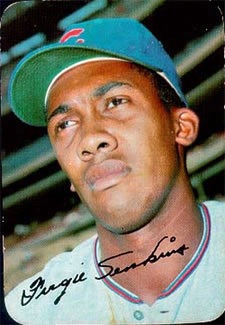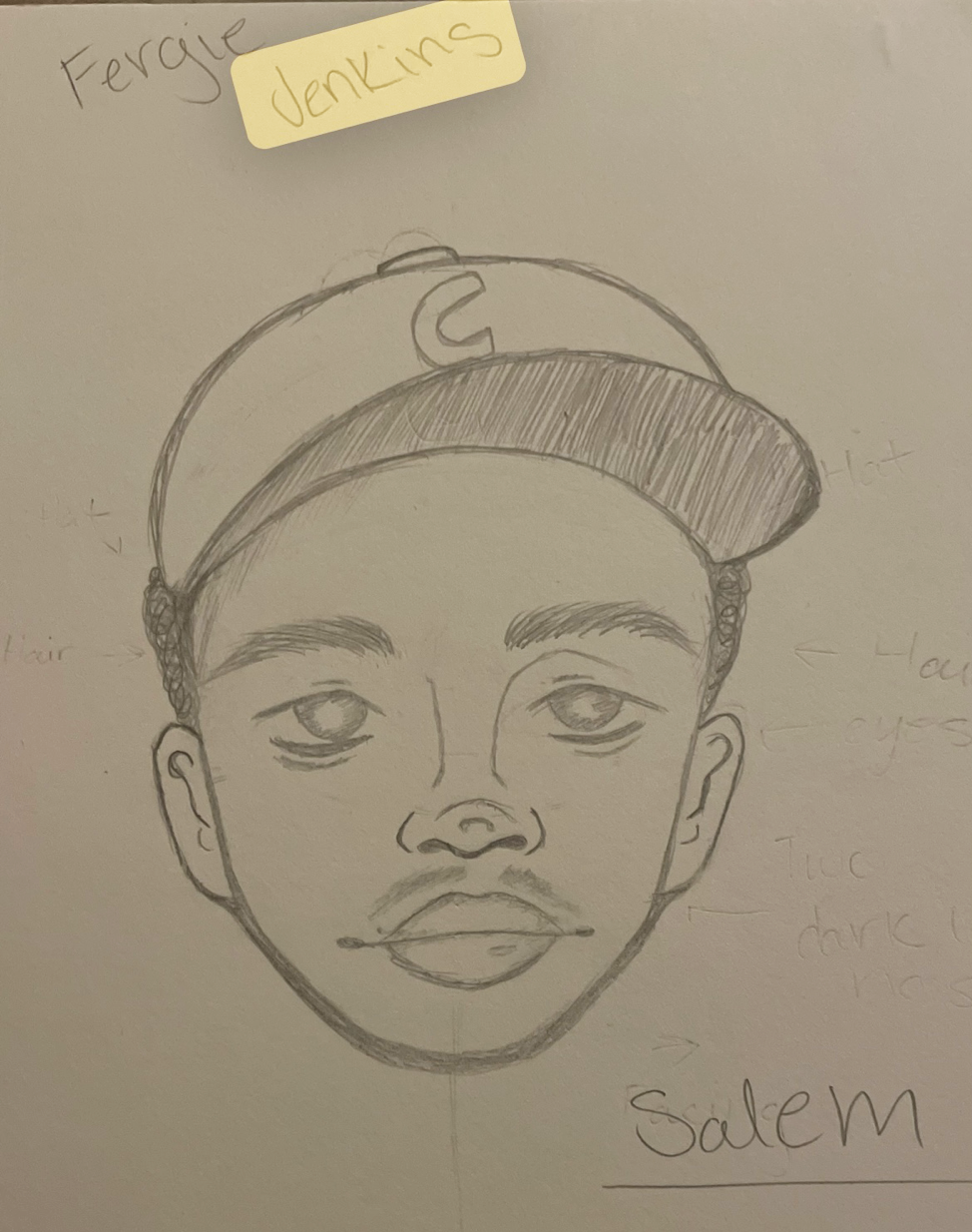October 1, 1970: Cubs’ Fergie Jenkins prevails in showdown for second place at Shea
 It was a money game. The 1970 baseball season had boiled down to a one-game contest with cash considerations on the last game of the season.
It was a money game. The 1970 baseball season had boiled down to a one-game contest with cash considerations on the last game of the season.
Unfortunately for the teams involved, the Chicago Cubs and New York Mets, it was runner-up money. At stake in this National League East season finale was simply second-place dollars, estimated at $1,000 for the runner-up players’ share versus the $500 third-place prize.12 Both teams downplayed the monetary aspect of the contest, since winning a pennant was the goal, but the rivalry was surely there.3
It had turned into a rivalry the year before when the Mets won two head-to-head September games in New York and overtook the Cubs (who had spent 129 days leading the division) to move into first place on September 10, 1969. The Mets never relinquished the lead and went on to win the inaugural NL East Division title, then the pennant, then the World Series.4 Like a smalltown-rivalry game in the early days of baseball, this was a city-rivalry game. Chicago and New York. The Second City versus the Big Apple.
The first day of October, the last day of the 1970 season, was a chilly 58-degree Thursday evening in Queens. The Mets and Cubs sported identical records of 83-78. They were tied for second place, both having been eliminated the weekend before when the Pittsburgh Pirates, who finished at 89-73, swept the Mets in Pittsburgh to clinch the division crown.5
The visiting Cubs started their chief gunslinger, Ferguson Jenkins, for the showdown. Fergie had already won 21 games for the year, giving him four straight seasons with more than 20 wins. The Mets countered with 10-game winner Jim McAndrew in lieu of their ace, 18-game winner and league ERA champ Tom Seaver. Seaver had outdueled Jenkins in the pivotal “Black Cat” game at Shea Stadium in September 1969 but was said to be suffering from a tired arm and skipped the final series of the season.6
Mets fans, who had turned out in record-setting droves all season, filled Shea Stadium for the finale and scored a fan appreciation gift of trays and coasters for their loyalty. A crowd of 48,314 attended the game, boosting the season’s gate to nearly 2.7 million fans.7
Both teams went down one-two-three in the first inning. In the top of the second, Chicago’s Joe Pepitone hit a one-out single to center field and went to third on a double by former Met mainstay Jim Hickman. Paul Popovich was walked intentionally to load the bases for Randy Hundley. The Cubs catcher was in a “woeful batting slump,” having watched his batting average plummet from .322 on August 17 to .244 on game day.8 But Hundley rose to the challenge and slashed a single to left field, driving home Pepitone and Hickman to give the Cubs a 2-0 lead they would not relinquish.
The Mets garnered a run in the bottom of the third when Jenkins walked Bud Harrelson, who reached second on McAndrew’s sacrifice. With Mike Jorgensen at the plate, Jenkins, normally a control pitcher, uncharacteristically threw a wild pitch to move Harrelson to third. Yet another wild one from Fergie sent Harrelson scampering home to register a Mets score without the benefit of a hit.
In the fourth and fifth innings, there were no runs scored. The only hit was a one-out single in the fifth by Jenkins.
The Cubs added to their lead in the top of the sixth inning. Billy Williams hit a leadoff single, his league-leading 205th hit. Williams then scored his league-leading 137th run of the season when Pepitone launched a rocket to right field. Pepitone’s 26th home run of the season put Chicago up 4-1. According to Chicago Tribune writer George Langford, Pepitone, a Brooklyn native and a New York Yankee from 1962 through 1969, had been booed roundly by the hometown fans all night and “completed his trip around the bases with a series of gestures to the hooting fans before doing his traditional leap on home plate with both feet.”9
Meanwhile, Jenkins continued his excellence on the mound and retired the Mets in order in the fifth and had yet to yield a hit after he dismissed the Mets with just a walk in the sixth.
The Cubs were retired one-two-three in the seventh. The Mets came to bat in the bottom of the inning still hitless against Jenkins, but any dreams of a no-hitter were dashed instantly when rookie Ken Singleton ripped a line-drive double off the left-field wall on his first pitch.10 Jenkins left Singleton stranded at second by retiring the next three batters.
The Cubs were retired in order in the top of the eighth inning. Then manager Leo Durocher made strategic changes in the bottom of the eighth. He moved Pepitone from center field to first base. Williams went from right field to left, Cleo James replaced Tommy Davis and went to center Field, and Johnny Callison replaced Hickman and went to right.
The wholesale substitutions did not include Ernie Banks, who was nearing the end of his legendary career in Chicago. The extent of Banks’ involvement was the honor of sharing the Cubs’ lineup card at home plate before the game.11
After the Mets were retired in order in the eighth, Popovich singled in the top of the ninth with one out, but advanced no farther when Tug McGraw, the third pitcher of the game for the Mets, set down the remainder of the side in order. The score stood at Cubs 4, Mets 1.
Jenkins needed nobody to save this game for him as he took the hill in the bottom of the ninth inning for his 313th inning pitched in pursuit of a league-leading 24 complete games.
Jenkins struck out Jorgensen, then induced Wayne Garrett to fly out to center fielder James for the second out. Standing just one out from his first career one-hitter, Jenkins faced Singleton, who slashed another double, though perhaps tainted when Callison fell approaching the ball, allowing it to reach the right-field wall.12
Jenkins then took matters into his own hands for the last out when he struck out Donn Clendenon for his eighth K of the game and his career-best 274th of the season. Time of the game, 2:09.
Thus, the first season of the ’70’s concluded. The Pittsburgh Pirates, with 89 wins, won just one more game than they did the year before, but it was good enough for the NL East Division title. The Mets, with 83 wins, lost 17 more games than the year before and ended up in third place. The Cubs slipped from 92 wins to 84 to settle for second place in the division for the second year in a row.
It was bittersweet satisfaction for the Cubs, who just the year before had squandered a lead to the Mets. So fervent was the Chicago fanbase that a second-place finish lured over 200 fans to meet the Cubs at Chicago’s O’Hare Airport to celebrate their 1970 accomplishment.13 Maybe next year.
Acknowledgments
Special thanks to John Fredland and Kurt Blumenau for input, editorial expertise, and 1970s NL East baseball talk. Special acknowledgement of the artistic talents of Salem Divinity for the original Fergie Jenkins sketch that accompanies this piece.
This article was fact-checked by Kevin Larkin and copy-edited by Len Levin.
Sources
The author accessed Baseball-Reference.com and Retrosheet.org for box scores, play-by-play information, and other pertinent data.
https://www.baseball-reference.com/boxes/NYN/NYN197010010.shtml
https://www.retrosheet.org/boxesetc/1970/B10010NYN1970.htm
Notes
1 George Langford, “Cubs Win, 2-0, Gain Tie for 2nd Place, Chicago Tribune, October 1, 1970: C1. By contrast, World Series winner money was $18,000 in 1970.
2 The 1970 money difference was the equivalent of $3,931.82 in 2023 dollars.
3 Leonard Koppett, “Cubs Topple Mets, 4-1 on 2-Hitter by Jenkins and Finish Second in East,” New York Times, October 2, 1970: S4.
4 The Mets went on to sweep the first NLCS 3-0 over the Atlanta Braves and put the cherry on the sundae with a 4-1 World Series victory over the Baltimore Orioles. It was a September to remember (23-7) that extended to a 7-1 October playoff run.
5 The Mets’ 83 wins in 1970 were 17 games under their 100-win 1969 season. The Cubs’ 84 wins in 1970 were 8 wins shy of their 92 in 1969. Meanwhile, the Pirates won 89 games, one more than 1969, and it was good enough to win the NL East Division.
6 Langford, “Cubs Win 2-0, Gain Tie for 2d Place.”
7 Koppett, “Cubs Topple Mets, 4-1 on 2-Hitter by Jenkins and Finish Second in East.”
8 Hundley had been injured in April and missed 89 games.
9 “Pepitone, a former Yankee, had been booed good-naturedly by the 48,314 fans throughout the game.” Langford.
10 Despite all the excellence in his Hall of Fame career, Jenkins never hurled a no-hitter. This game with 21 hitless outs may have been the closest he came to that accomplishment.
11 Langford.
12 Langford.
13 “2nd Place Cubs Return,” Chicago Tribune, October 2, 1970: C18.
Additional Stats
Chicago Cubs 4
New York Mets 1
Shea Stadium
New York, NY
Box Score + PBP:
Corrections? Additions?
If you can help us improve this game story, contact us.


